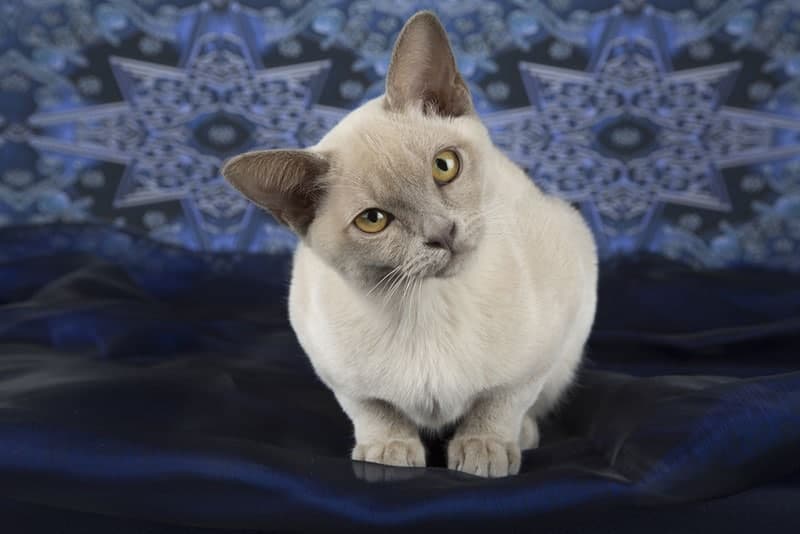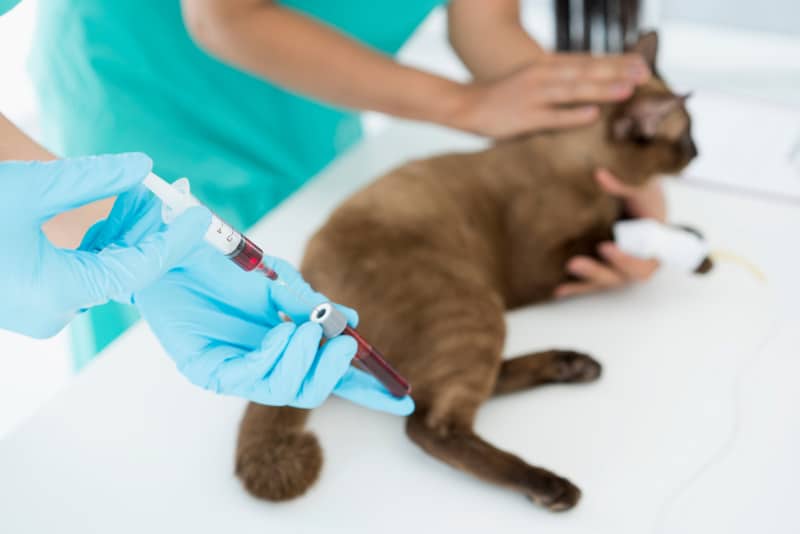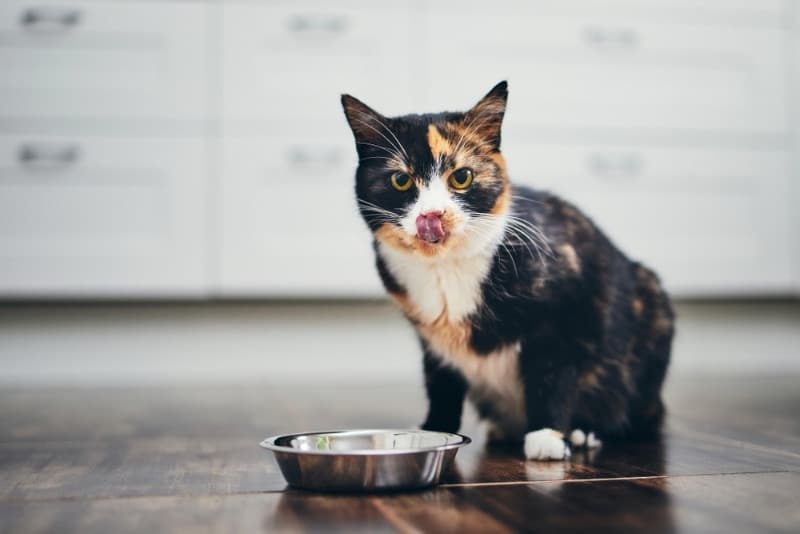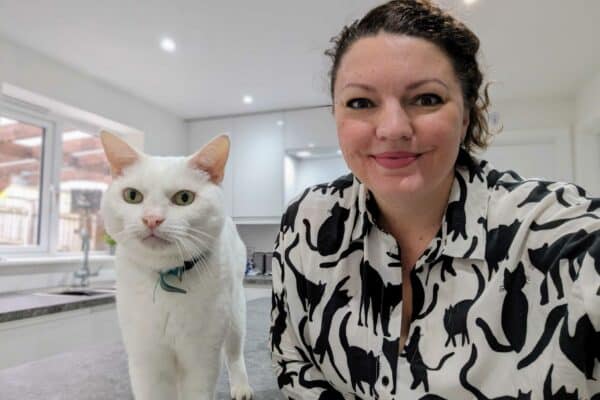Irritable bowel syndrome—the title alone is sufficient to make you’re feeling uncomfortable. Even when you’ve been lucky sufficient to by no means expertise the ache, discomfort, and embarrassment of this pretty frequent situation, you most likely know somebody who has. However do you know that cats may also undergo from an identical situation?
In cats, we discuss with it as inflammatory bowel illness or IBD, however it might even be categorized as gastritis, enteritis, gastroenteritis, or continual diarrhea, all of which might type a part of feline IBD however usually are not the entire story.
Let’s look nearer at IBD in cats, from what causes it to how one can handle it.

IBS vs. IBD
You is likely to be questioning what the distinction between these two phrases really is, and it’s largely to do with the species concerned. People can undergo from each IBS and IBD, whereas cats and different animals can solely be described as having IBD.
IBS, because the title suggests, describes a syndrome, or a set of signs that sometimes happen collectively, enabling the situation to be extra precisely described and categorized. It isn’t itself a particular analysis, nevertheless, IBD could be a explanation for IBS.
Signs describe how an sickness or downside “feels,” and solely people can talk that. A clinician can take heed to these signs and mix them with the affected person’s medical indicators to make an goal evaluation.
Relating to cats and different pets, they can not describe their very own signs, which is why veterinarians depend on the historical past offered by the pet’s proprietor, mixed with the animal’s medical indicators, to make a analysis.
For instance:
| Symptom | Medical Signal |
| Sore leg | Limping, lameness |
| Earache | Head tilt, rubbing ear |
| Nausea | Drooling, vomiting, inappetence |
Now that we’ve acquired the semantics out of the best way, let’s transfer on to the situation itself.

What Is Feline Inflammatory Bowel Illness?
IBD in cats happens when the partitions of the digestive tract change into thickened and infected, decreasing its skill to operate correctly. Though there are a lot of situations that may produce the identical or related indicators, IBD isn’t because of an an infection, meals response, or parasite, though these should be dominated out as a way to make a analysis. It could actually have an effect on cats of all ages however is extra frequent amongst middle-aged and older cats.
There are particular cell sorts which are often concerned in IBD which strongly recommend that it’s an immune-mediated situation. It might be triggered by sure meals, infections, or stress. It could actually happen as a part of a fancy situation known as triaditis1, which includes irritation of the liver, pancreas, and small gut. IBD may also be characterised as idiopathic, which implies that no inciting trigger will be recognized.
What Are the Indicators of Feline Inflammatory Bowel Illness?
IBD can have an effect on totally different components of the digestive tract, so the medical indicators will rely on what space is concerned.
- Gastritis (irritation of the abdomen)
- Enteritis (irritation of the small gut)
- Colitis (irritation of the big gut or colon)
The irritation may happen in only one space or may have an effect on all three. Though colitis usually produces extra noticeable indicators, like frequent, bloody diarrhea, it’s often the least extreme by way of sickness.
| Gastritis | Enteritis | Colitis | |
| Frequency of feces | Regular to lowered | Regular to lowered | Elevated |
| Diarrhea | Gentle or none | Great amount, watery | Small to massive quantities of mucoid, could also be bloody |
| Vomiting | Frequent, shortly after consuming | Occasional, 4–6 hours after consuming | None |
| Urge for food | Decreased or absent | Regular to elevated | Regular |
| Weight reduction | Average | Average to extreme | Gentle to none |
| Power ranges | Regular to barely lowered | Decreased | Regular |
Gastritis: When the abdomen is infected, it may end up in vomiting, however it gained’t have an effect on the digestion and absorption of vitamins from meals that’s saved down.
Enteritis: The vast majority of nutrient absorption takes place within the small gut, so when that is infected, the physique can change into severely malnourished, notably if a considerable amount of the gut is concerned, or if the cat is affected by gastroenteritis (irritation of each the abdomen and intestines). The urge for food could also be elevated to attempt to compensate for the nutrient loss.
Colitis: The principle operate of the big gut is the reabsorption of fluid from the waste materials. Irritation on this space doesn’t often have a major impression on vitamin however can result in dehydration if not addressed.

How Is Feline IBD Identified?
A big a part of diagnosing IBD in cats is ruling out some other causes of the medical indicators. This could be a irritating course of, however a essential one. There is no such thing as a particular check for IBD, so a very powerful a part of the diagnostic course of is ruling out all of the issues that it isn’t.
Affected person historical past is a crucial part of this course of, so in case your cat’s medical indicators have been happening for some time, attempt to preserve an in depth document of what they eat, any modifications (nevertheless minor) of their habits, any attainable publicity to toxins, uncommon meals, and so on. Images of their vomit and feces, though fairly gross, may also be actually useful.
Relying in your cat’s medical indicators, your vet might carry out the next checks:
- Bodily examination: Focusing notably on hydration, physique situation, and stomach palpation.
- Blood checks: These can point out the presence of systemic irritation or an infection, assess organ operate and protein ranges, in addition to establish any viral infections, reminiscent of Feline Leukemia or Panleukopenia, and rule out different diseases like diabetes and hyperthyroidism.
- Fecal examination: To verify for parasites.
Generally vets will trial some remedies earlier than making a analysis, reminiscent of giving anti-parasitic or anti-inflammatory drugs. A weight loss program trial can be a typical and necessary step, not simply by way of analysis however in formulating a remedy plan.

Definitive Analysis
The one approach to definitively diagnose feline IBD is thru intestinal biopsies; nevertheless, they aren’t at all times fully correct. Biopsies are carried out underneath common anesthesia and could also be executed endoscopically (least invasive) or surgically (most correct).
As soon as all different illnesses have been excluded, there are two situations that may solely be differentiated with a biopsy: IBD and intestinal lymphoma. Biopsies will solely give a particular analysis if the pattern is taken from an space of the digestive tract that’s affected by the illness, so false negatives do happen.
The remedy of each IBD and intestinal lymphoma are sometimes very related, and it isn’t unusual for remedy to begin with out biopsies.
There are two principal kinds of feline intestinal lymphoma:
- Small cell lymphoma – A extra diffuse type that impacts a bigger space of the gut however is extra conscious of remedy, with a imply survival of two–4 years following analysis.
- Giant cell lymphoma – Tends to type localized plenty and has a a lot poorer prognosis. Surgical procedure will be tried, however survival instances are usually round 2–4 months.
How Is Feline IBD Handled?
Within the majority of instances, the goal of remedy is administration relatively than treatment. Some cats might expertise a whole remission of all medical indicators after extended remedy, whereas others will must be managed for the remainder of their lives.
Once more, the specifics will rely on the situation of the irritation and the severity of medical indicators, however frequent IBD remedies embody:
- Eating regimen administration: Using a hypoallergenic, extremely digestible meals to cut back the quantity of irritation within the digestive tract and maximize nutrient absorption. There are a selection of veterinary-based diets which have been developed for the administration of feline IBD, and there have additionally been some reported successes utilizing uncooked diets, though care should be taken to make sure enough taurine ranges are offered.
- Corticosteroids: Steroids (e.g., prednisone) are a generally used medicine to deal with immune-mediated, inflammatory situations. At greater doses, steroids trigger immunosuppression, which may help scale back any autoimmune part, whereas additionally decreasing irritation. Because of the problematic uncomfortable side effects that prime doses of steroids produce, the goal is to cut back dosing to the bottom therapeutic stage as soon as the medical indicators have improved.
- Cobalamin: AKA vitamin B12, that is important for wholesome immunity, nervous system, and digestive operate. In cats with small intestinal IBD, cobalamin is poorly absorbed, resulting in additional deterioration of the situation and creating a really vicious cycle. By supplementing Cobalamin, with injections initially and later with oral dietary supplements, the general well being of the cat is improved, as is their intestinal operate.
- Chemotherapy: An oral medicine known as Chlorambucil can be utilized along side the above therapies to deal with autoimmune situations, in addition to scale back the buildup of thickened and irregular tissue within the digestive tract. That is the remedy of alternative for feline intestinal lymphoma however can be efficient towards extreme IBD.
- Antiemetics: Drugs to cut back vomiting and nausea are sometimes used within the early levels of remedy if gastritis or gastroenteritis are concerned.

What Is the Prognosis for Cats With IBD?
Normally, as soon as an acceptable remedy regime has been discovered, cats do fairly effectively. In some instances, remedy will be progressively lowered over time, however more often than not, administration is lifelong. Prognosis is linked with how intensive and extreme the inflammatory modifications within the intestine wall are, suggesting that instances which are recognized and handled earlier within the illness course of could have a greater end result than cats which have intensive modifications of their gastrointestinal tract.
Cats that spend quite a lot of time outside will be harder to handle as it’s inconceivable to fully management what they’re consuming. The success of remedy in these instances comes right down to how extreme the cat’s situation is, and the way a lot “off-plan” consuming they do.
In instances the place lymphoma has not been excluded, the result will largely rely on whether or not we’re treating IBD, small cell lymphoma, or massive cell lymphoma.

Summing Up
Feline inflammatory bowel illness is a comparatively frequent situation, largely affecting cats which are middle-aged or older. It could actually masquerade as many gastrointestinal issues, all of which should be dominated out earlier than a analysis of IBD will be reached.
Early remedy and administration of this situation may end up in fewer vital modifications to the gastrointestinal wall, thus bettering prognosis.
Though occasional vomiting and diarrhea usually are not unusual in cats, if they’ve been displaying these signs for more than 48 hours, and notably when you discover weight reduction or lethargy, it is best to ebook them in for a checkup together with your vet ASAP.
Featured Picture Credit score: Andy Gin, Shutterstock

